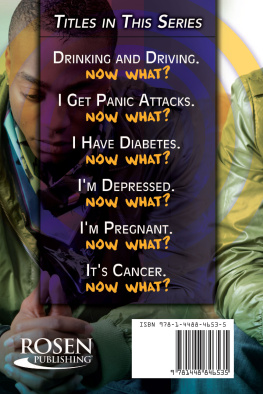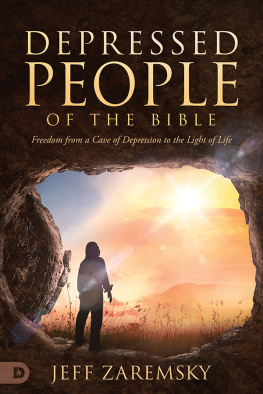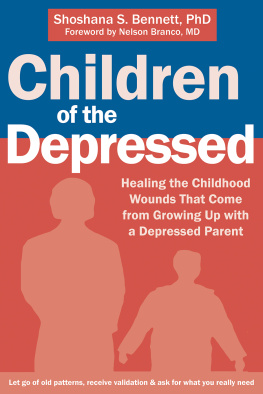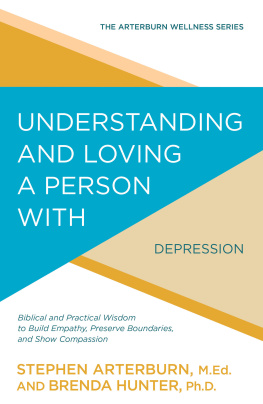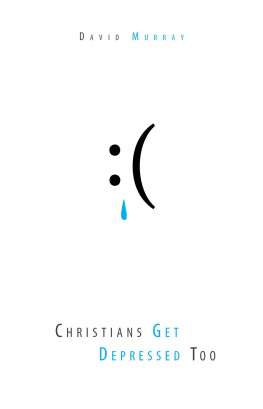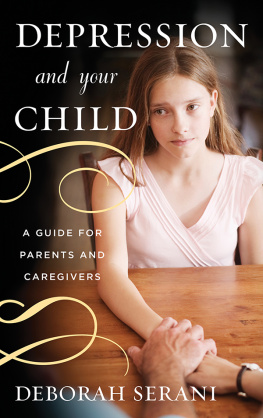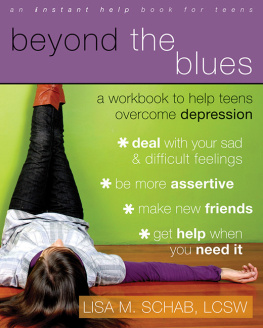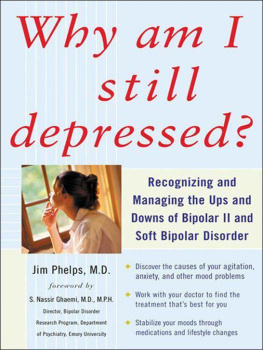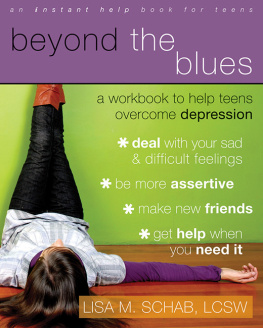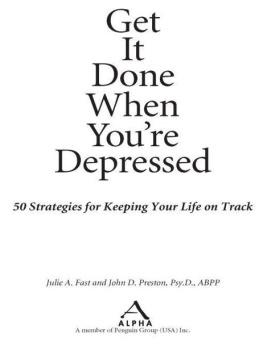Golant - What to Do When Someone You Love Is Depressed
Here you can read online Golant - What to Do When Someone You Love Is Depressed full text of the book (entire story) in english for free. Download pdf and epub, get meaning, cover and reviews about this ebook. City: New York, year: 2012, publisher: Random House Publishing Group, genre: Science fiction. Description of the work, (preface) as well as reviews are available. Best literature library LitArk.com created for fans of good reading and offers a wide selection of genres:
Romance novel
Science fiction
Adventure
Detective
Science
History
Home and family
Prose
Art
Politics
Computer
Non-fiction
Religion
Business
Children
Humor
Choose a favorite category and find really read worthwhile books. Enjoy immersion in the world of imagination, feel the emotions of the characters or learn something new for yourself, make an fascinating discovery.

- Book:What to Do When Someone You Love Is Depressed
- Author:
- Publisher:Random House Publishing Group
- Genre:
- Year:2012
- City:New York
- Rating:5 / 5
- Favourites:Add to favourites
- Your mark:
- 100
- 1
- 2
- 3
- 4
- 5
What to Do When Someone You Love Is Depressed: summary, description and annotation
We offer to read an annotation, description, summary or preface (depends on what the author of the book "What to Do When Someone You Love Is Depressed" wrote himself). If you haven't found the necessary information about the book — write in the comments, we will try to find it.
Filled with compassion and understanding, this guide covers caring for someone who has the blues as well as dealing with someone who is clinically depressed, even suicidal.
Golant: author's other books
Who wrote What to Do When Someone You Love Is Depressed? Find out the surname, the name of the author of the book and a list of all author's works by series.
What to Do When Someone You Love Is Depressed — read online for free the complete book (whole text) full work
Below is the text of the book, divided by pages. System saving the place of the last page read, allows you to conveniently read the book "What to Do When Someone You Love Is Depressed" online for free, without having to search again every time where you left off. Put a bookmark, and you can go to the page where you finished reading at any time.
Font size:
Interval:
Bookmark:
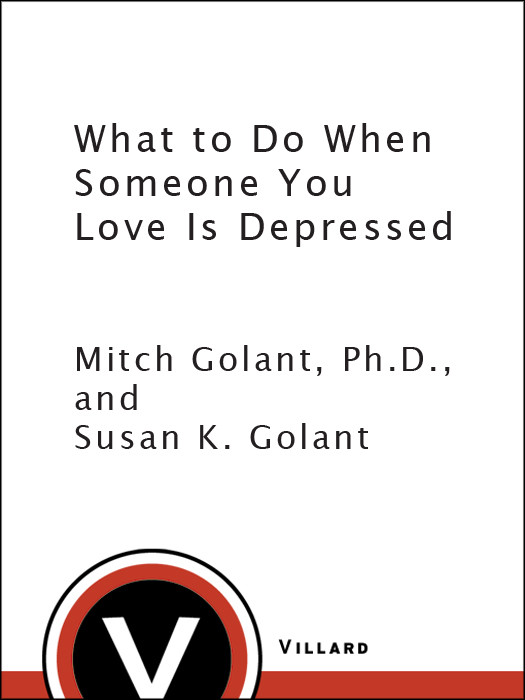
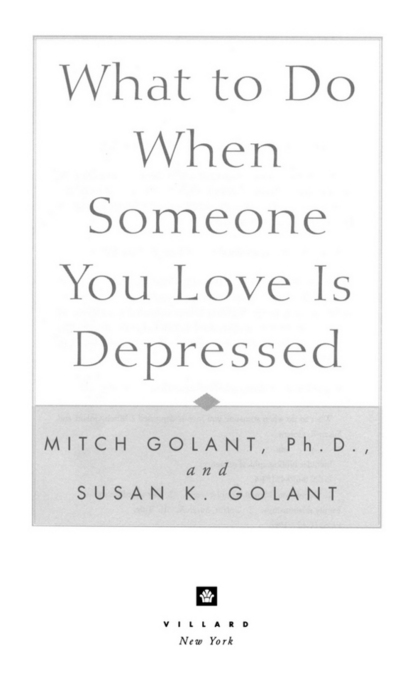
Copyright 1996 by Mitch Golant, Ph.D., and Susan K. Golant
All rights reserved under International and Pan-American Copyright Conventions. Published in the United States by Villard Books, a division of Random House, Inc., New York, and simultaneously in Canada by Random House of Canada Limited, Toronto.
V ILLARD B OOKS is a registered trademark of Random House, Inc.
Grateful acknowledgment is made to Random House, Inc., and Don Congdon Associates, Inc., for permission to reprint an excerpt from Darkness Visible, by William Styron. Copyright 1990 by William Styron. Rights throughout the British Commonwealth are administered by Don Congdon Associates, Inc., New York. Reprinted by permission of Random House, Inc., and Don Congdon Associates, Inc.
Library of Congress Cataloging-in-Publication Data
Golant, Mitch.
What to do when someone you love is depressed / Mitch Golant and Susan K. Golant.
p. cm.
Includes bibliographical references.
eISBN: 978-0-307-82241-3
1. Depression, MentalPopular works. 2. Depressed personsFamily relationships. I. Golant, Susan K. II. Title.
RC537.G62 1996
616.8527dc20 96-31009
Random House website address: http://www.randomhouse.com/
v3.1
And feed your spirit hope and comfort; remember,
I wont abandon you in this nether sphere.
DANTE ,
The Inferno,
CANTO VIII , -

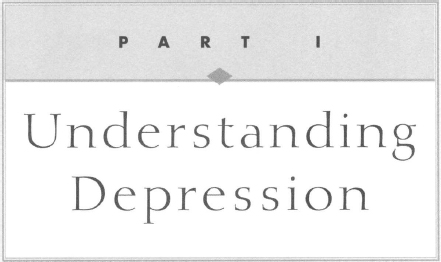

You Love Is
Depressed
When someone you love is depressed
you feel lost, afraid, confused.
you long for the person who was.
you dont recognize who he or she has become.
you feel shut out.
you feel angry and frustrated.
you feel drained.
you are desperate for a way to connect.
you feel guilty and alone.
you will do anything to help.
When someone you love is depressed, you may experience a wide range of emotions such as these, and more. You may feel shock. You might wish to push away the whole situation and deny reality. You could be angry. How could this happen? you may thunder. Why is this happening to us, to our family, to my friend? You might withdraw or feel hopeless and depressed yourself. You might even try negotiating with God or with your loved one: If only you would try harder If only you would get up in the morning, Ill be more responsive to you.
Your loved one may have become depressed because of having just lost a job or experienced a financial setback, or may be dejected because of a recent death in the family or the breakup of a relationship. There is a continuum between simply having the blues to suffering from a full-blown clinical depression. My familys story falls toward the more difficult end of the spectrum. I share it now as a way to convey how deeply felt is the caregivers struggle to help a depressed loved one and the genuine pain that the depressed individual suffers.
When I was fourteen years old, my mom became depressed. My mothers depression, precipitated by my older brothers departure to England for graduate studies at Oxford University, felt as if a blackout shade had dropped first over her room and then the entire house. There had been episodes of depression before, like partial eclipses of the sun, which had thrown us off balance for a few moments. But in the past, after the shadow had receded, we were all able to get back on track.
This was different. For days and then weeks, my mom would not leave her room. Her every breath was a moan of pain. She wore only black nightclothes. She rarely dressed. Somehow dinner would appearbut she didnt. The aloneness was deafening.
I remember trying to help. Id go into her room after school and sit at the edge of her bed, hoping to cheer her with stories about my friends schoolyard antics. Id leave tests that I was proud of on the nightstand. She didnt respond. Sometimes I found myself just talking to her, pretending that she was listening and acting lighthearted. In truth, I was terrifiedit was all I could do to keep from bursting.
At other times she would rant. It would start rather quietly, and at first I was thankful she was speaking. But soon her tone would turn surly and hard as she went on about some person or event that had ruined her life. She threatened suicide. Sometimes I was the cause of her problems.
No amount of protestation or reasoning would penetrate that drawn shade of despair.
My father sought help. Our family doctor would make timely home visits. On occasion my mother responded positively to this show of concern. But sometimes after the doctor left she would rail at us for embarrassing her and aggravating the situation. My mom was ashamed that our doctor would think she was crazy, and as a result she refused any treatment except pain pills. She would use various prescribed medications for the many physical complaints that became the focus of her problems. After several months of this roller coaster of silence, ranting, physical complaints, and outright rejection, my dad retreated and my grades and achievement started to suffer.
My mother was never quite the same.
Many years later, while in graduate school, studying educational psychology, I decided to test the waters of psychotherapy and train as a hot-line counselor for the Los Angeles Suicide Prevention Center. During the interview, one of the directors asked, Why do you have an interest in suicide prevention? I hemmed and hawed, cleared my throat, started talking about helping others and always having been interested in psychology. I mentioned in passing that my mother had been depressed at times.
At the end of the interview, the director said, I think the best reason you offered for doing this training is that it might help you understand your mother. Her depression is a good reason for your engaging in this work. In fact, it makes you highly qualified. Thats excellent training!
With that surprising introduction began a long road to understanding my mothers depression and, in the process, helping myself become a better son, a more sensitive caregiver, and a more empathetic psychologist. What I didnt know thenbut what the director had seen so clearly during the interviewwas that my interest in psychology was motivated by my need to find ways to help my mom, my family, and myself.
What motivates me now is to share with you what Ive learned about how to cope when someone you love is depressed. What I have discovered from years of training and from having counseled hundreds of families who have shared their sorrows and their joys is that there are ways you can help someone you love who is depressed. And in that process, you will grow closer.
Unlike chronic illnesses such as heart disease or arthritis, depression carries with it a stigma of shame that adds to its intensity. This stigma can prevent the 17 million Americans who suffer from depressionand who desperately need treatmentfrom seeking help. Indeed, according to a recent report in
Font size:
Interval:
Bookmark:
Similar books «What to Do When Someone You Love Is Depressed»
Look at similar books to What to Do When Someone You Love Is Depressed. We have selected literature similar in name and meaning in the hope of providing readers with more options to find new, interesting, not yet read works.
Discussion, reviews of the book What to Do When Someone You Love Is Depressed and just readers' own opinions. Leave your comments, write what you think about the work, its meaning or the main characters. Specify what exactly you liked and what you didn't like, and why you think so.

